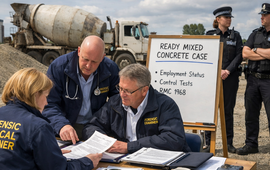
If your business hires contractors, understanding the difference between “Outside IR35” and “Inside IR35” is essential. It affects how contractors are taxed and whether your business takes on additional tax responsibilities. Here’s what it means in practice and how to stay compliant.
What is IR35?
IR35, also known as the off-payroll working rules, applies when a contractor provides services through an intermediary such as a limited company, sometimes referred to as a personal service company (“PSC”). The legislation aims to prevent “deemed employment”, where a worker is engaged like an employee but is paid through a company structure, resulting in a different tax treatment.
If an engagement is classified as “Inside IR35”, it’s treated as employment for tax purposes. If it’s “Outside IR35,” the contractor’s company is genuinely self-employed and can be paid gross, with no tax deductions necessary. Understanding the IR35 status of each engagement is critical because it determines which party is liable for the tax payments.
Outside IR35: What It Means
When a contractor is outside IR35, they are self-employed for tax purposes. The engagement and working practices align with a genuine business-to-business service rather than operating like an employee, e.g. the supply of labour.
For you as “the client,” hiring contractors on an Outside IR35 basis means you don’t deduct Income Tax or National Insurance contributions. Where a third party is involved in the chain above the limited company, such as a recruitment agency, any tax risk associated with misclassification is passed to them, provided a Status Determination Statement (SDS) is created by the client and given to both the worker and the agency.
Engaging contractors outside IR35 is low-friction and low-risk because the tax differential between taxes paid by contractors and those paid on salaries is small. With an evidence-based process in place, hiring outside IR35 is a safe and practical way to access specialist talent.
Inside IR35: What It Means
A contractor who is determined as “Inside IR35” is considered “employed for tax purposes”, and the earnings paid to their limited company must be treated as earnings from employment.
In this scenario, your business becomes primarily responsible for deducting and paying income tax and national insurance contributions. That responsibility can be delegated to any agency (the “fee-payer”) below you in the supply chain by creating an SDS and providing it to both the worker and the agency. Without the creation and giving of the SDS, the agency is not authorised to make the tax deductions.
How IR35 Status Is Determined
If your organisation is medium or large and engages contractors, you are legally responsible for deciding the IR35 status of each engagement. This decision must be based on the contract terms and working conditions, and it should be determined using the principles laid down in decades of employment status case law.
A defensible process should consider all key status tests, and the SDS should meet the statutory criteria: it should contain a status conclusion reached with reasonable care, along with reasons for the conclusion.
If your team doesn’t have in-house IR35 expertise, seeking professional support is strongly advised. Using a specialist IR35 assessment tool built on case law not only ensures consistency but also demonstrates that your business has taken reasonable care, a vital protection that helps to transfer the tax risk from your firm to any third-party “fee-payer” below you in the supply chain.
Getting IR35 Right
Errors in IR35 determinations can lead to unnecessary tax bills, interest, and penalties. To help ensure compliance, review contracts and working practices regularly, issue a detailed SDS for each engagement, and maintain clear records. Training HR and compliance teams on how to identify and document key risk areas can also help demonstrate strong governance.
Many organisations now choose to partner with IR35 experts to manage this process. Doing so ensures consistent assessments, reduces administrative pressure, and provides peace of mind that compliance standards are met.
Why Businesses Choose IR35 Shield
IR35 Shield provides independent, case law-backed IR35 determinations trusted by hundreds of UK organisations. With over 200,000 assessments completed, our proven methodology has helped firms across multiple sectors to pass HMRC compliance checks quickly and without penalty.
Our specialist services include IR35 assessments, compliance audits, defence cover, and training via the IR35 Academy; all designed to help you manage every aspect of IR35 compliance confidently and efficiently.
If you want to protect your business and hire contractors with confidence, book a free consultation to see how IR35 Shield can help.



